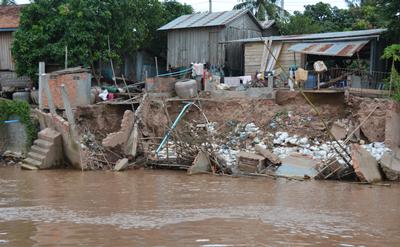
The livelihoods of millions of people living along the world’s biggest river systems are under threat from a range of stressors caused by the daily economic, societal and political activity of humans – in addition to the long-term effects of climate change, according to new research.
A study by the University of Southampton and the University of Illinois, USA, takes a big-picture approach to review the health and resilience of the world’s large river systems, their deltas and their vulnerability to extreme events.
The article is published in the journal One Earth.
Joint study-author Professor Steve Darby, of Geography and Environmental Science at Southampton, comments: “Rivers respond to changes in the environment through self-adjusting processes of erosion and sedimentation. When not stressed by extreme events like flooding or drought, these responses typically allow rivers to absorb change. However, data from many new studies now suggest that the world’s great waterways are becoming more vulnerable as the effects of human activity and climate change combine and compound.”
Fellow-author Professor Jim Best, of the department of Geography and Geographic Information Science at Illinois, adds: “Climate change is of huge importance in terms of changing flood or drought frequency and intensity. However, there is a range of other stressors affecting big rivers such as damming, sediment mining, pollution, water diversions, groundwater extraction and the introduction of non-native species – all of which affect rivers on a timescale that has much more immediate consequences.”

For example, the team reviewed past research on the drivers of flooding in the Mekong River Delta in Southeast Asia, which supports about 18 million people and a vast rice agricultural area. These studies suggest that delta subsidence – or sinking – because of groundwater extraction beneath the delta is now more of a problem, especially as the region now also receives far less sediment because of sediment trapping behind upstream dams and large-scale mining of sand from the bed of the delta’s channels.
The researchers say the scale of the effects of sediment starvation and subsidence in driving increased flood risk is currently far greater than sea-level rise generated by global climate change and warn that when all of these pressures are combined, it leads to a real risk of crossing a major tipping point in the next 10-20 years.
Politics also play a significant role in the health and resiliency of the world’s major river systems, the paper reports. The study authors say the current COVID-19 pandemic is influencing regulatory enforcement of pollution monitoring in the United States, enabling polluters to avoid penalties if they argue violations are a result of the pandemic. They point out this has happened in the past too, with stresses from the Gulf War leading to increased river pollution in the Tigris-Euphrates River Basin, a situation that was also compounded by upstream damming in Turkey. They argue there is urgent need for governance at the local level, across to the international level, to confront these issues effectively.







